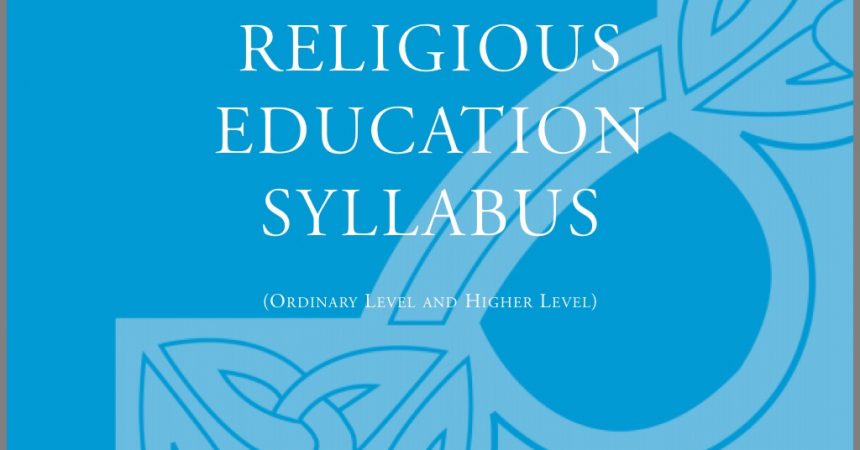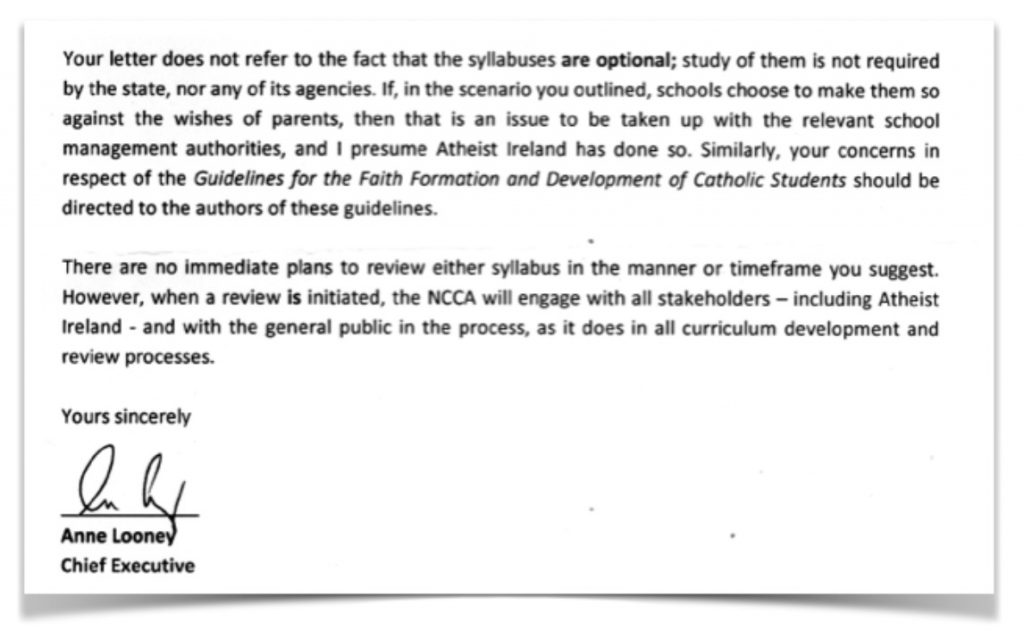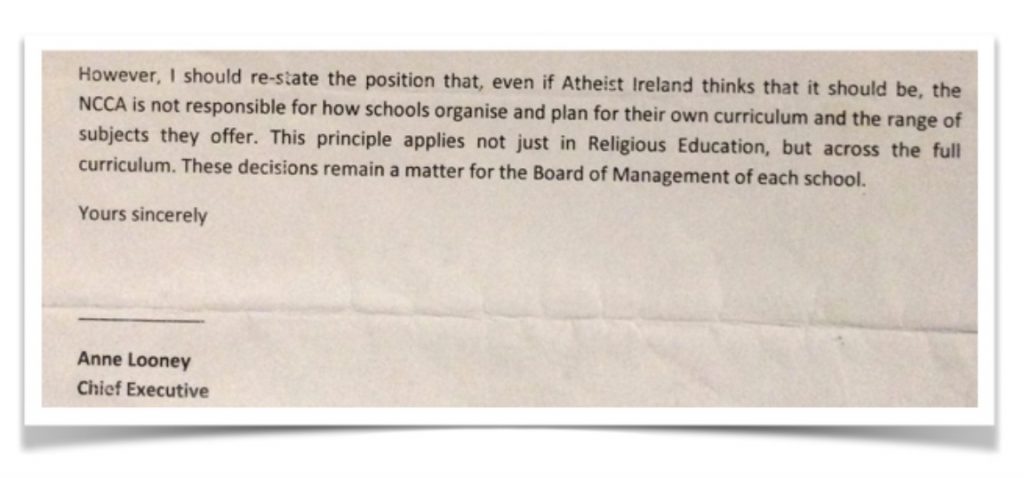(1/7) Introduction and Context
In recent weeks, Atheist Ireland has researched hundreds of documents obtained under the Freedom of Information Act from the NCCA (National Council for Curriculum and Assessment) about how it devised the State Religious Education course at second level. This Religious Education course is supposed to be for all religions and none.
These documents support the case that Atheist Ireland has been making for years:
(a) That the State second level Religious Education Course disrespects the philosophical convictions of atheist and secular families and that, contrary to Article 42.1 of the Constitution, it discriminates against atheist and secular families.
(b) That State-funded Irish schools are illegally forcing children of atheist and secular families, and religious minorities, into religious instruction and Catholic faith formation, contrary to Article 44.2.4 of the Constitution, and several human rights treaties that Ireland has signed up to.
1.1 How State-funded schools breach these rights
Nearly all State-funded second level schools and colleges breach these rights, by combining the State’s optional Religious Education course with the school’s own Catholic Religious Instruction and faith formation, and telling parents that the combined course is a core subject (and compulsory for all students irrespective of their religious or non-religious philosophical convictions).
This happens in all State-funded schools, not only those with a Catholic Patron body but also all ETB schools and colleges. Nearly all ETB schools and colleges have agreements with the Catholic Church regarding the delivery of Catholic Religious Instruction and formation.
Given the legal framework in Ireland, this means that the Catholic Church effectively has control over the State Religious Education Curriculum at second level, which is an exam subject at Junior and Leaving Certificate level in the vast majority of schools in Ireland, and which is supposed to be for all religions and none.
To make things worse, the same thing will soon happen at primary level. The NCCA is now working on a new State course for primary schools about Religion, Beliefs and Ethics. This too is meant to be for all religions and none. But State-funded primary schools will be able to teach this course through a Catholic ethos, unless the Education Act is amended to prevent them from doing this.
1.2 How the Catholic Church controls the State Course
The Catholic Church controls the State Religious Education Course at second level in four ways.
(a) The Catholic Church had undue influence in the formation of the course by the NCCA, while other religious and nonreligious perspectives were marginalised. This report by Atheist Ireland shows how that happened.
(b) The Catholic Church controls how the state Religious Education Course is delivered in nearly all schools and colleges, as it is combined with Catholic Religious Instruction and formation.
(c) The Catholic Church controls the hiring of teachers, as only those that are trained to teach Catholic Religious Instruction can be hired if Catholic Religious instruction and the state Religious Education Course are combined. This applies to all VEC/ETB schools and colleges as well as second level schools under the patronage of the Catholic Church.
The Irish Catholic Bishops’ Conference said in 2014 that:-
“Under the terms of circular-1979 the VEC schools were able to provide permanent posts for qualified RE teachers and were asked to provide two hours of religious education per week to each class. While the structures have changed and we now have ETBs (Education Training Boards) rather than VECs, the same basic principles still apply and, where they are implemented, parents can send their children to ETB schools with confidence that the school will play its part in the faith education of their children. Once again, it is important that parents inform themselves as to what arrangements are actually in place for Religious Education in whatever school they choose for their children.”
(d) In another recent FOI that Atheist Ireland received, we discovered that the Archbishop of Dublin sanctions all staff hired in the Mater Dei Institute. The Patron of the Mater Dei Institute is the Archbishop of Dublin. This is where some of the Second Level Religious Education teachers are trained, and it is a requirement of Circular Letter 7/79 that VEC/ETB schools and colleges hire religion teachers trained in the Mater Dei Institute. The Mater Dei Institute is a college of DCU yet, according to this FOI, all staff must be sanctioned by the Archbishop.
This effectively gives the Catholic Church complete control over the State Religious Education Course at second level. It also gives the Church control over the Religious Education of all minorities including atheist and secular families, control over the hiring of teachers and control over the staff that train teachers to teach religious education.
1.3 The Existing Secondary School Course
The NCCA devised and rolled out the State second level Religious Education course in the 1990s and 2000s, before and after the Education Act 1998. Atheist Ireland was not founded at that time, so we had no influence on the process. If Atheist Ireland had been in existence, there is no doubt that the NCCA would have sought to marginalise us in the same way as they marginalised Baha’is, Buddhists, Humanists and others who sought to have an input. We would have strongly resisted this marginalisation.
The hundreds of documents that Atheist Ireland has now obtained show that the NCCA and the Department of Education knew about their legal duty to not discriminate on the ground of religion, and their obligations to respect all parents’ convictions under the Constitution. However, the NCCA gave the Catholic Church too much deference and influence, it excluded representatives of non-Christian beliefs, it gave Catholic Diocesan Advisors a formal role in delivering the course, and it ignored clear warning signs that schools would merge the State course with the schools’ own Catholic religious instruction.
The NCCA will be revising this State Religious Education course later this year. It is important that it be amended to reverse these problems and to meet human rights standards.
1.4 The New Primary School Course
The NCCA is now preparing a similar course for primary schools called Education about Religions, Beliefs and Ethics. Since we were founded in 2008, Atheist Ireland has been actively lobbying for a human rights based State course that can teach children about religions and beliefs in an objective, critical and pluralistic manner (Article II of Protocol 1 European Convention), that can fulfil the State’s Constitutional obligation to respect the inalienable right of all parents (Article 42.1), and that can observe the duty to provide for the moral education of all children (Article 42.3.2), without doing so through religion. We have raised this issue directly with the Taoiseach, the Minister for Education and the NCCA.
The NCCA is approaching the new primary course in a more impartial way than it did twenty years ago. Under Section 42.1.c of the Irish Human Rights & Equality Commission Act 2014, it is obliged to protect the human rights of its members, staff and the persons to whom it provides services. This is significant for the State courses at both primary and second level, because it means that today’s second level State course does not meet the human rights standards that the NCCA is using today, in devising the new primary level State course.
However, even the new primary course will still breach constitutional and human rights, unless there are changes in the Education Act 1998 to ensure that it is delivered in an objective, critical and pluralistic manner, which is out of the control of the NCCA. The Irish Human Rights and Equality Commission has made recommendations to amend the Education Act 1998 to bring it into line with the European Convention.
1.5 Constitutional and Human Rights
Atheist Ireland briefs and addresses international human rights bodies that monitor Ireland’s obligations under human rights treaties. In recent years, nine separate reports from United Nations and Council of Europe Human Rights bodies have told Ireland that it is breaching the human rights of atheist, secular and minority faith parents, children and teachers in Irish schools.
Atheist Ireland has a policy called the Schools Equality PACT (an acronym for Patronage, Access, Curriculum and Teaching) that outlines the legal changes needed. Bizarrely, the Irish State claims it is constitutionally obliged to allow State-funded schools to discriminate against parents and children in this way.
1.6 Atheist Ireland first raised this with NCCA in 2010
Atheist Ireland first raised these issues with the NCCA in 2010.
Anne Looney, Chief Executive of the NCCA, responded that no parents had told the NCCA that their children endured the disrespect of the State for their parents’s philosophical convictions; that the phrase about the ‘acknowledgement’ of the non-religious interpretation of life would need to be addressed in any future review; and that the syllabus content and rationale presumes an engagement with non-religious belief systems that is not accurately reflected in the word ‘acknowledge.’
On this basis, Ms Looney said that it appeared to her, and to those who worked on the development of the syllabuses, to be entirely in line with human rights principles at European and UN levels. She also said that the OSCE had invited the NCCA to present their Guidelines on Intercultural Education in Post primary Schools as a model of good practice in the field.
However, on the crucial issue of how the course was actually delivered on the ground, Ms Looney did not take any responsibility. Instead she suggested that Atheist Ireland raise our concerns with the relevant school management authorities, or with the authors of the Guidelines for the Faith Formation and Development of Catholic Students. She added that there were no immediate plans to review the syllabus but, when they did so, they would engage with all stakeholders including Atheist Ireland.
1.7 Atheist Ireland response to the NCCA in 2010
Atheist Ireland responded to the NCCA as follows in 2010.
When the NCCA was developing the Religious Education course, the OSCE’s Toledo Guiding Principles on Teaching About Religion and Belief were not in place. Based on these principles, it is clear that consideration of human rights and the practical application and effect of those rights in the school system was not given priority by the NCCA. The European Court of Human Rights has stated that “The Convention is intended to guarantee not rights which are theoretical or illusory but rights which are practical and effective” (Airey v Ireland 1979 – para 36 ECHR).
The OSCE may have invited the NCCA to present the Guidelines on Intercultural Education as a model of good practice. But that is not the Religious Education Course under the curriculum. If the OSCE had examined the RE course it would have found it not in compliance with the Toledo Guiding Principles.
Of the 56 participating states to the OSCE, the Holy See is the only one that has rejected the Toledo Guiding Principles, while at the same time the Catholic Church in Ireland supports the NCCA Religious Education course under the curriculum. That does not make any sense to us, if it is now being claimed that the RE course meets the standards of the Toledo Guiding Principles.
The NCCA suggests that we take up our concerns with the authors of the Guidelines for the Formation and Development of Catholic Students. But under human rights law, implementation of the Toledo Guiding Principles is not the responsibility of NGOs. It is the responsibility of the State under Human Rights law to take care that the information in the curriculum is conveyed in an objective, critical and pluralistic manner. See Kjeldsen, Busk Madesen and Pedersen v Denmark, ECHR on 7th December 1976, para 53), (TGP).
The UN Human Rights Committee in its General Comment No. 22 concludes that the freedom of religion or belief “permits public school instruction in subjects such as the general history of religions and ethics if it is given in a neutral and objective way” (TGP). In developing the RE course at second level no consideration was given to this human rights principle and consequently the human rights of non-religious parents and the practical application of those rights were ignored.
The Guidelines for the Formation and Development of Catholic Students have consequences for the access of the children of non-religious parents to the RE Course under the curriculum as they deny the practical and effective application of their human rights. Catholic Church teaching on equality and freedom of conscience does not correspond with the basic principles of human rights.
The NCCA must have been aware that Catholic Church teaching does not permit the delivery of any Religious Education course about religions and beliefs in a neutral manner. They believe if religious education is limited to a presentation of the different religions, in a neutral way; it creates confusion or generates religious relativism or indifferentism.
The NCCA must also have been aware that any RE course about religions and beliefs taught to Catholic Students in any school whatsoever is subject to the authority of the Catholic Church.
The Toledo Guiding Principles state “while it is important to ensure that representatives of religious communities are allowed to give input and advice, this should not be taken to the extreme of giving them too much decision-making power at the cost of abdicating state responsibility. The European Court has made it clear that excessive involvement of religious authorities from one community in decisions that affect the rights of those belonging to another community may itself amount to a violation of the right to freedom of religion or belief.”
An individual’s personal non-religious beliefs cannot be sufficient reason to exclude that person from teaching about religions and beliefs. Human Rights are guaranteed to every individual, and to exclude parents seeking a secular human rights education for their children from a course about religions and beliefs is discrimination. The children of non-religious parents must give up their human right to freedom of conscience in order to access this course as in the majority of cases it is taught through the eyes of the Catholic Church.
The Toledo Guiding principles state that: “An individual’s personal religious (or non-religious) beliefs cannot be sufficient reason to exclude that person from teaching about religions and beliefs. The most important considerations in this regard relate to professional expertise, as well as to basic attitudes towards or commitment to human rights in general and freedom of religion or belief in particular, rather than religious affiliation or conviction.”
The contact Atheist Ireland gets from parents seeking to remove their child from the Religious Education Course at second level relates mainly to Junior Certificate. In all cases the course was compulsory in their school. It is not acceptable just to point out to us that it is not compulsory in theory when it is in practice.
Not one of these parents ever contacted the NCCA, as not everyone is informed about the work of the NCCA. All felt that the Course was religious instruction and were dismayed that the non-religious were acknowledged in a section of the course called ‘Challenges to Faith’ alongside fundamentalism and materialism. So it is not fair to state that it is just a phrase that needs changing just because the NCCA have never received any complaints from parents. We do not believe that the NCCA is being sensitive to the individual rights of these parents and the negative impact on the self esteem of students.
The Toledo Guiding principles state that: “The negative impact on the self-esteem and sense of belonging of students who feel excluded has been well documented. Parents who feel that their (religious) beliefs are not respected in the school and school curriculum are also less likely to feel a sense of engagement with the learning that takes place in the schools their children attend”.
We therefore again ask the NCCA to commission an urgent review of the RE course at second level to determine how its status and delivery might be revised such as to take into account:
- The rights of non-religious parents seeking a secular education based on human rights law.
- The Toledo Guiding Principles.
- The Guidelines on Intercultural Education in Post-Primary Schools.
1.8 NCCA second response to Atheist Ireland in 2010
Ms Looney responded to these detailed concerns with a two paragraph letter, repeating that the NCCA would contact Atheist Ireland when there is any review of the syllabus. However, she again declined to take any responsibility on behalf of the NCCA for how the course is delivered. She wrote:
“However, I should restate the position that, even if Atheist Ireland thinks it should be, the NCCA is not responsible for how schools organise and plan for their own curriculum and the range of subjects they offer. This principle applies not only in Religious Education, but across the full curriculum. These decisions remain a matter for the Board of Management of each school.”
These initial letters, supplemented by our lobbying at national and international human rights levels in the intervening years, form the background to our decision this year to identify, using Freedom of Information requests, how the course was actually developed and delivered on the ground.
The following sections of this report reveal these breaches of human rights and constitutional rights, along with the specific documents that demonstrate how these breaches came about:
- Before the NCCA Committee was Formed
- Composition of the NCCA Committee
- Original Committee Discussions
- Merging the Curriculum with Faith Formation
- Delivery Strategy to Schools
- Constitutional and Human Rights Breaches










0 Comments
No comments!
There are no comments yet, but you can be first to comment this article.